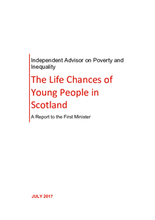– INTRODUCTION
Tackling poverty in Scotland is a priority of the Scottish Government and is extremely challenging in the current political and economic context. In my first report, ‘Shifting the Curve’ 1 , I recommended a review of the life chances of young people in Scotland. This report is the follow up to that recommendation. Alongside an evidence review I commissioned2 , this report outlines key issues facing young people today, and offers recommendations for government, employers, and for wider society, to improve the life chances of young people from less advantaged backgrounds.
The last twenty years have transformed our understanding of the first years of children's lives. We now understand the importance of high quality early-years services – including health, education, and childcare – to ensure children get the best start in life. But a good start is not inoculation. High quality early years experience needs to be followed up with good primary and secondary education. Good schools have to lead to high quality destinations, including not only university but excellent post-school training and development, meaningful modern apprenticeship placements, decent employment opportunities, and the chance to be independent from parents. For today's young people, none of these issues are straightforward and, for many, there are significant barriers on the road to adulthood.
The review focuses on the age band of 16-24 years, as choices of career, further training, employment, and housing can be particularly problematic for young adults. Decisions at this stage can set the course for adulthood. Late adolescence and early twenties is a period of life fraught with temptations and risks, when parents have reducing control and the influence of peer groups grows. It is a time when decisions can be complex and options are often limited by prior educational attainment.
Within this age band, the report pays particular attention to school leavers who are not going on to university as a first destination. Free university tuition is a fantastic advantage for those who go on to higher education. But the overall picture suggests that the university sector has had greater protection from hard financial times than the further education and the college sector. A further challenge is that, in Scotland, the minimum school leaving age is 16 but, for the UK, the 'National Living Wage' is not automatically paid until the age of 25 – before this, the only guarantee is a lower minimum wage, which is unlikely to bring the independence young people often look for.
This generation of young adults face challenges their parents largely didn’t have to deal with. What we have to do, as policy makers and practitioners, is to make those challenges less daunting so young people can respond positively when they meet them. At this particular moment, it would be naïve to hope to turn the clock back completely. But we should look to make things better where we can.
The material within this report has been developed from two main sources:
- A formal review of the evidence, which I commissioned from Scottish Government analysts, on the challenges facing Scotland's young people, particularly those from low income backgrounds. This has been published separately and is available on the Scottish Government website.
- Engagement with a wide range of experts. The main experts, of course, are young people themselves. With this in mind, I commissioned a series of small and informal engagement events with a range of young people, working with the Scottish Youth Parliament, the Prince’s Trust, Black and Minority Ethnic Infrastructure in Scotland (BEMIS), South Lanarkshire College, and Cyrenians. We also spoke to modern apprentices working in the Scottish Government. The sessions gave young people the chance to say what issues they considered to be most important, and how they might be dealt with. I’m not suggesting that these informal sessions provide representative samples (or sub-samples) of young people; but they were extremely useful in challenging my thinking and I’ve used what young people told me to illustrate some of the points I want to make. I also had a roundtable discussion with academics, and met a number of stakeholders with a key interest in these issues, many of whom echoed the issues raised by the young people I met.
The main body of the report sets out particular problems, as identified by the evidence and/or by young people themselves, and offers recommendations for further action: section 2 focuses on transitions, the labour market and pay, while sections 3 and 4 look at housing and mental health respectively.
Relevance to Care
Care leavers were indicated as a key group of concern in this study. 4,602 young people over age 16 who left care were reportedly eligible for aftercare services in Scotland in 2016. Care leavers are at greater risk of poor outcomes, including higher rates of unemployment, homelessness, and mental health issues. The report also mentions a report from England, where female care leavers were about three times more likely to become teenage parents than their female peers.

